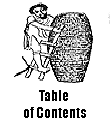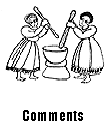
 Why Women Should be Priests by Dawit B The road to her apartment had always been symbolically terrifying; a kind of maze that might trap her. Roads in her life were linked with being lost and trapped; her marriage to a man who is trapped by time into a cocoon-like prison constructed by devious synapses. Mulu had a conspicuous start in life. Her mother was a poor widow. She had bestowed Mulu to the church at the age of six; perhaps an act of love. The church, unable to give her proper care, transferred the young girl to an orphanage in Addis. The experience in the orphanage was a blur. It was a series of lessons in submission. The instruction was never enough to replace a mother's role in the socialization of her daughter. Socialization of women is the carving of a mask worn by women for the fantasies of man. By the age of thirteen she had noticed her lack of mask, yet it was a sort of freedom. If one pays the price, one is able to live under a different rule. It was common for people to say of her, "Yamtal ende? Ich'lij tikekel adelichm!" Church was her constant solace. People played genteel characters in church, leaving the harshness of life behind as they entered the building, maybe an attempt to hide their true faces from God, or fully knowing that God expected such performance from them. She chose a life in this gentle play at the age of sixteen, exiling her flesh from its natural sins. A nun at sixteen, such a grand sacrifice seemed particularly logical to a child's mind. Her sacrifice was rewarded. Missionaries who recognized her quiet pain decide to take her with them to Italy. Being in a different country had no real effect on her condition. She felt like an outsider in Italy, just like she had felt in Ethiopia. Adulthood, however, gave her a certain place, itself with a price. She met a lonely Ethiopian man more bewildered by the world than she was. He worked as a cleaner at the church. He had come from a small village, plucked out of a Middle Ages existence by a conspiring fate. He brought with him memories of country life and haunted mountains. Her vows to God seemed foolish. God after all had all of humanity, but this man had no companion in the world. She moved in with the man, adding her life to the crimes of fate. Her entry into his life signaled his exit from the world. He stopped working and she became his breadwinner. She also became a nursing assistant and professed to him the miracles of modern medicine. Intoxicated by her tales, he declared his intention of becoming a doctor. Prior schooling was not a detail he worried about. He simply went to different classes, sitting behind everybody on the last chair of those enormous lecture halls. He never registered.
They had a little girl and seven years passed. His schooling hadn't progressed a day. She was content in thinking of him as an undiscovered genius (a kind of modern-day memirE). The number of Ethiopians in Italy had steadily increased. Mulu and her husband became surrogate parents to many. Most who met them were overpowered by their generosity; nevertheless, they still found them a bit odd. They became involved in founding an Ethiopian Orthodox Church. For her the Church was the only thing she really understood. In church she took on a magnificent aura...an assured dignity. Money, however, was tight with her husband not working. Her two jobs were no longer sufficient. In order to solve the problem, she moved with her daughter to the USA. She started working and her daughter enrolled in school. This was the time she came into my life. I had noticed her around the neighborhood. She looked habesha yet her walk had a neurotic flair that suggested otherwise. She knocked on my door one Saturday morning and introduced herself. The other habesha in the building had told her about me. I invited her in and she told me her life story. In her long journey she had managed not to get bitten with that tragic habesha virus called pride. Her life was simple to her and she made no attempt to make it otherwise. We became friends. She would cook dinner for me when she could, and I would take her shopping. She was working in restaurant with a predominantly Mexican workforce. The employees, knowing little English, spoke Spanish. Her linguistic isolation at her workplace became a big problem. She told me that the employees at the restaurant were conspiring to get her fired. Ena simeTa zim ylalu. She was convinced of the need to learn Spanish. In the next eight months she became an adequate Spanish speaker. Language was a gift of hers: she spoke Amharic, English, Italian, and Spanish. Her mastery of Spanish solved her fear of workplace conspirators. She declared, "Ahun ema bEteseb hon'n." Problems were always around the corner. After the ninety-two election she had a serious talk with me about moving back to Europe. She believed that America was no longer safe because Bush had lost the election and it was only a matter of time before he armed his forces in his home state for a civil war. I wasn't surprised by her fears. She, like everybody else, had her own way of spinning events. Her spin was based on Ethiopian standards. We can only use the logic we know. Weeks after her civil war scare, she decided to get a roommate -- an older Ethiopian woman whom she had meet in church. The arrangement was a failure within a few months after the woman moved in. Mulu was convinced that the woman was trying to poison her. She told me that the apartment had a strong sulfuric odor. I asked the woman about it and she explained that the odor was roach spray. This explanation held no relief for Mulu. She was convinced of the attempts on her life, "Esti wiCH ager meTtew ya'n medhanit neger aytewutm!" After much negotiation we were able to find the woman another apartment. Mulu's husband came to the States after two years of separation. She had supported him back in Italy. She was neither delighted nor angry about his arrival. Somehow she had accepted her fate and he was a big part of it...maybe her eternal punishment for breaking her vows to God. Of his arrival she proclaimed, "Zim'blo and bota tmhrtu'n bimar Tru neber." The husband told me that he would be attending a semester of classes at the local university. Mulu had told me not to ask her husband too many detailed questions, so I said nothing. She knew he wasn't really a medical student. It was simply easier to pretend that he was. He came back from his first day of school with a paper that read campus visitor. Most of his time was spent wandering around the neighborhood yard sales. Their apartment was fast becoming a collection of junk. One of his purchases was a used answering machine. Mulu called me at home that night for our regular conversation. She sounded uneasy and she spoke in code. The next day she told me that we would have to speak in code because her husband had installed a recording device on her phone. "Yesu neger mn ytaweqal?" was the explanation. Around Easter she invited me to the newly constructed Ethiopian Church in town. She was again a founding member. As prayer services ended she was regal with song. She also placed the large church drum on her shoulders, igniting an enchanted rhythm, the rhythm giving way to a trance as she swayed along the pathway of history and divinity, finding peace and a place. That night at dinner I asked her why women were not allowed into the priesthood. She answered, "Discrimination newa." She felt ambivalent about the Church. The church was her sanctuary, yet it gave a limited welcome. I don't know if she would have become a priest if the Church had allowed it. Life is never that simple. What is in us is seldom what makes us happy. Mulu's relationship to the world was a complex matter. It is alienation born out of individuality. An outsider lacks the comfort of knowing the continuity of community. A loner wants to tell you everything the minute he/she meets you because of the lack of a belief in the continuity of relationships. Mulu was like that. She had to always explain everything to me when we spoke; it was as if there were no tomorrow. Claudio Magris had described people like Mulu as haunted creatures who had not been granted that saving oblivion thanks to which one forgets that death is never far from one's heels and, that before it catches up, there are other catastrophes. I moved away to another town, but never forgot Mulu's magical world. She still calls me once in a while and we talk about her new fears and her old ones. The world is mostly oblivious to her struggle. She is also oblivious to humanity's arbitrary norms. She is still unflinching about her truth. Her husband has yet to complete his studies. Mulu continues to work, raising a strikingly independent daughter. |

|

|

|

|

|
| © Copyright SELEDA Ethiopia, April 2001. All Rights Reserved. |